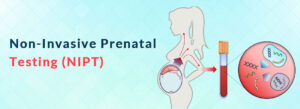
Understanding the Benefits and Risks of Invasive Prenatal Testing
When it comes to prenatal care, expecting parents are faced with numerous decisions that impact both the mother and the unborn child's health. One of the critical aspects of prenatal care is Invasive Prenatal Testing, a procedure designed to detect genetic abnormalities and potential health issues in the fetus. These tests are highly specialized, providing parents with valuable information, but they also come with risks. Understanding what is invasive testing and how it works can help parents make informed decisions during pregnancy. This type of testing is especially vital for those who want a detailed genetic diagnosis early on. In recent years, many parents have been asking, what is invasive testing in pregnancy? Simply put, it refers to medical procedures that go beyond the surface to examine fetal cells or tissues directly. Invasive testing provides unmatched accuracy compared to basic screenings, making it a reliable tool in pregnancy care.
In recent years, many parents have been asking, what is invasive testing in pregnancy? Simply put, it refers to medical procedures that go beyond the surface to examine fetal cells or tissues directly. Invasive testing provides unmatched accuracy compared to basic screenings, making it a reliable tool in pregnancy care.
What is Invasive Prenatal Testing?
Invasive Prenatal Testing refers to a set of diagnostic procedures used to assess the health and genetic makeup of a developing fetus. Unlike non-invasive methods like ultrasounds or blood tests, invasive testing involves inserting instruments into the womb to collect samples of amniotic fluid, placenta, or fetal tissues. These tests are generally recommended when there are concerns about the baby’s health or if earlier screening results indicate potential issues.
Asking “what is invasive test in pregnancy” often leads parents to explore options like CVS and amniocentesis. These invasive genetic testing techniques are offered to detect serious genetic disorders with clinical accuracy.
Common Types of Invasive Prenatal Testing
Amniocentesis Pregnancy Test: This test involves extracting a small amount of amniotic fluid from the uterus to check for genetic disorders or birth defects like Down syndrome.
Chorionic Villus Sampling (CVS): CVS tests involve taking a sample of cells from the placenta to identify genetic conditions such as cystic fibrosis or Tay-Sachs disease.
Both of these tests fall under the category of invasive testing pregnancy, and they are highly accurate but are typically reserved for high-risk pregnancies where genetic abnormalities are suspected. These procedures form the backbone of modern invasive genetic testing.
Benefits of Invasive Prenatal Testing
The Invasive Prenatal Testing benefits are numerous, particularly for those facing higher risks of genetic issues or complications in pregnancy.
- Accurate Diagnosis:
Unlike non-invasive tests, which offer probabilities, invasive testing provides an accurate diagnosis. These tests can confirm genetic conditions such as Down syndrome, neural tube defects, or chromosomal abnormalities with a high degree of precision. - Early Detection:
With invasive prenatal tests like CVS, abnormalities can be detected as early as 10 to 12 weeks of pregnancy. Early diagnosis allows for better preparation and early medical intervention if needed. - Family Planning and Preparation:
Knowing whether the fetus has a genetic disorder can help parents make informed decisions about the future, including treatment plans and delivery options. For many, this knowledge provides peace of mind and prepares them emotionally and practically for any eventual challenges. - Detailed Information for High-Risk Pregnancies:
For women over 35 or those with a family history of genetic disorders, invasive testing offers detailed information, reducing the uncertainties that come with non-invasive methods. If you’ve ever wondered what is invasive testing, it’s this level of depth that makes it invaluable.
In addition to detection, invasive genetic testing also supports research and the medical community by contributing to case data and understanding of rare conditions.
Risks of Invasive Prenatal Testing
Despite its benefits, invasive testing carries inherent risks that should be carefully considered. If you’re evaluating whether invasive testing in pregnancy is right for you, it’s crucial to weigh these concerns with a healthcare provider.
- Risk of Miscarriage
One of the most concerning invasive prenatal testing risks is the possibility of miscarriage. The risk varies by procedure: amniocentesis pregnancy test has a miscarriage risk of approximately 0.1% to 0.3%, while CVS pregnancy test has a slightly higher risk of around 1%. - Infection
Since invasive tests involve penetrating the womb, there is a small risk of infection that could affect both the mother and the fetus. However, these cases are rare, especially when performed at a reputable fetal medicine centre. This highlights the importance of choosing a safe facility for invasive genetic testing. - Injury to the Baby
Although rare, there is a chance that the needle or instruments used during invasive testing could injure the fetus. Careful placement guided by ultrasound minimizes this risk, making it a relatively uncommon occurrence. - Premature Rupture of Membranes:
In some cases, invasive tests like amniocentesis can lead to premature rupture of the amniotic sac, which may result in complications such as preterm labor.
Any decision to go through with invasive prenatal testing must account for these known risks and be discussed with an expert. For some, the invasive prenatal testing risk may outweigh the benefits, while for others, it offers clarity during a stressful time.
Who Should Consider Invasive Prenatal Testing?
Invasive testing pregnancy is not recommended for all pregnancies. It is typically advised for those at higher risk of genetic abnormalities, such as:
- Women over the age of 35.
- Those with a family history of genetic conditions.
- Women who have received abnormal results from non-invasive screening tests.
- Pregnancies resulting from in-vitro fertilization (IVF), as the procedure may carry a higher risk of genetic abnormalities.
Knowing what is invasive testing can help families make informed decisions. It’s essential to consult with specialists at a trusted fetal medicine centre to assess your specific situation and decide whether invasive testing is necessary.
Considerations Before Choosing Invasive Prenatal Testing
Before opting for invasive testing in pregnancy, parents should take several factors into account:
- The Reason for Testing:
Understand why your doctor is recommending invasive prenatal testing. If non-invasive screening tests have suggested abnormalities, invasive tests may be necessary for a conclusive diagnosis. - Personal Comfort with Risks:
The potential risks, such as miscarriage or infection, should be weighed against the benefits. Some parents may feel that the risk of invasive procedures outweighs the advantages, especially if the likelihood of a genetic disorder is low. In such cases, discussing the invasive prenatal testing risk with your doctor is essential. - Availability of Resources:
If you are concerned about the availability of high-quality care, choosing a well-equipped and specialized fetal medicine centre in Chandigarh like Garbh is crucial. Such centers provide the expertise and resources to minimize risks and ensure accurate results. - Financial Costs:
Since invasive testing is more expensive than non-invasive methods, the financial implications should be considered. Contacting a fetal medicine centre can help clarify costs and available payment options for invasive genetic testing.
Why Choose Garbh for Invasive Prenatal Testing?
At Garbh, we specialize in providing advanced prenatal care, including invasive prenatal testing. With a dedicated team of fetal medicine experts and cutting-edge technology, we ensure the highest standards of care and precision for both mother and baby. Our fetal medicine centre in Chandigarh offers comprehensive services that prioritize safety and well-being, making Garbh your trusted partner in pregnancy care.
Whether you’re wondering what is invasive test in pregnancy or seeking peace of mind through early diagnostics, our team is here to guide you.
Conclusion
Invasive testing is a powerful tool for parents looking to understand their baby’s health and genetic makeup. With its ability to provide accurate diagnoses and early detection of potential issues, it offers invaluable insights for families at risk of genetic conditions. However, like any medical procedure, it comes with its own set of risks and considerations. Choosing a reputable and well-equipped fetal medicine centre, such as Garbh, ensures that you receive the best care and guidance throughout your pregnancy.
Curious about your invasive testing pregnancy options? Trust Garbh to guide you through every step of the process with expert care. Contact us today for more information!
Frequently Asked Questions
What is Invasive Prenatal Testing?
Ans. Invasive Prenatal Testing involves procedures like amniocentesis or CVS to diagnose genetic abnormalities in a developing fetus by collecting samples from the amniotic fluid or placenta. These are common types of invasive genetic testing.
What are the risks of Invasive Prenatal Testing?
Ans. The primary risks include a small chance of miscarriage, infection, or injury to the fetus, but these are rare when performed at a specialized fetal medicine centre. Always evaluate the invasive prenatal testing risk in the context of your pregnancy.
Who should consider Invasive Prenatal Testing?
Ans. It is typically recommended for women over 35, those with a family history of genetic disorders, or if non-invasive tests indicate potential abnormalities. These cases usually benefit most from invasive testing.
How accurate is Invasive Prenatal Testing?
Ans. Invasive testing offers a highly accurate diagnosis, with nearly 100% reliability for detecting genetic conditions like Down syndrome and cystic fibrosis.
What is the best time to perform Invasive Prenatal Testing?
Ans. Chorionic Villus Sampling (CVS) can be done as early as 10 to 12 weeks, while amniocentesis is usually performed between 15 to 20 weeks of pregnancy. Timing varies depending on the specific invasive testing pregnancy procedure recommended.

